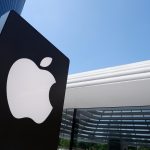
- Media & Gaming
Apple's Formula One Film Hits $155 Million in Global Opening
6 minute read

Apple’s Formula One blockbuster demonstrates streaming giant’s successful expansion into theatrical releases while boosting subscriber growth
Key Takeaways
- Apple’s “F1” movie generates $155 million global opening and becomes the company’s largest theatrical debut, validating its $200-300 million investment in cinematic content.
- Stock faces pressure amid AI strategy concerns as Apple Intelligence rollout delays and lukewarm WWDC reception raise questions about the company’s artificial intelligence capabilities.
- Strategic partnerships reduce financial risk with Warner Bros. collaboration on “F1” distribution creating a template for future content ventures while driving Apple TV+ subscriptions.
Introduction
Apple achieves a landmark success in entertainment with its Formula One racing film “F1” earning over $155 million globally, even as the tech giant faces mounting criticism over its artificial intelligence strategy. The movie’s commercial triumph demonstrates Apple’s ability to execute long-term content investments while highlighting the company’s strategic shift toward premium entertainment experiences.
The stark contrast between Apple’s cinematic success and AI struggles reflects broader challenges facing the company as it navigates competitive pressures in multiple markets. Wall Street’s lukewarm response to recent AI announcements at WWDC underscores investor concerns about Apple’s position in the rapidly evolving artificial intelligence landscape.
Key Developments
Apple’s “F1” movie surpassed industry expectations with a $144 million global opening weekend, marking the company’s largest theatrical debut. The film earned $7 million from Thursday night screenings and an additional $3 million from preview showings, according to industry reports.
The production represents Apple’s most ambitious cinematic venture, featuring A-list talent including Brad Pitt and Formula One champion Lewis Hamilton. Director Joseph Kosinski applied expertise from “Top Gun: Maverick” to create authentic racing sequences filmed at actual Formula One events.
Apple developed custom camera systems using iPhone 15 Pro components, including the 48-megapixel sensor and A17 Pro chip, to capture high-quality footage. This integration showcases the company’s hardware capabilities while creating promotional opportunities for consumer devices.
Market Impact
The film’s $27.7 million in IMAX revenue demonstrates strong consumer appetite for premium entertainment experiences. Apple’s stock performance reflects mixed investor sentiment regarding the company’s diversification strategy and AI development concerns.
Industry analysts view the theatrical success as validation of Apple’s services division, which has served as a profit engine since 2016. The movie positions Apple TV+ as a serious competitor in the streaming market while driving subscriber acquisition through exclusive content.
Box office performance indicates “F1” will soon surpass “Napoleon” with its $228 million total to become Apple’s highest-grossing film. The success creates momentum for Apple’s broader entertainment strategy and content investment initiatives.
Strategic Insights
Apple’s collaboration with Warner Bros. on distribution creates a risk-sharing model that could template future projects. This approach reduces financial exposure while leveraging traditional studio expertise in marketing and theatrical release strategies.
The company’s integration of professional filmmaking technology into consumer products creates cross-promotional opportunities. Apple positions itself as a leader in mobile imaging technology while appealing to creative professionals through demonstrated capabilities.
However, Apple’s delayed AI rollout raises questions about innovation leadership. The company faces pressure to deliver sophisticated artificial intelligence features while maintaining its privacy-focused approach, creating strategic tension between market demands and brand positioning.
Expert Opinions and Data
CEO Tim Cook emphasizes Apple’s unique technical contributions to the project, highlighting camera technology integration and promotional campaign engagement. The company’s approach combines hardware innovation with content creation to drive ecosystem adoption.
Venture capitalist Chamath Palihapitiya expressed skepticism about Apple’s innovation potential, stating the company has no “chance of anything” regarding upcoming breakthroughs. This criticism reflects broader concerns about Apple’s competitive position in emerging technologies.
Senior executive Johny Srouji discussed plans to use generative artificial intelligence for chip design acceleration during a Belgium speech. CNBC reports that Apple executives have internally discussed acquiring Perplexity AI, with M&A head Adrian Perica proposing the idea to senior leadership including services chief Eddy Cue.
One box office analyst told Vulture that despite commercial success, the movie “may end up being a very expensive commercial for original content on Apple TV.” This perspective highlights questions about return on investment for Apple’s entertainment ventures.
Conclusion
Apple’s “F1” success demonstrates the company’s ability to execute complex, long-term content strategies while facing significant challenges in artificial intelligence development. The film’s commercial performance validates Apple’s entertainment investment thesis and strengthens its streaming platform positioning.
The company’s strategic integration of hardware innovation with content creation creates unique competitive advantages, though concerns about AI capabilities and regulatory pressures continue to influence investor sentiment. Apple’s entertainment success provides a foundation for services revenue growth while the company addresses technology development challenges in artificial intelligence and ecosystem openness requirements.








